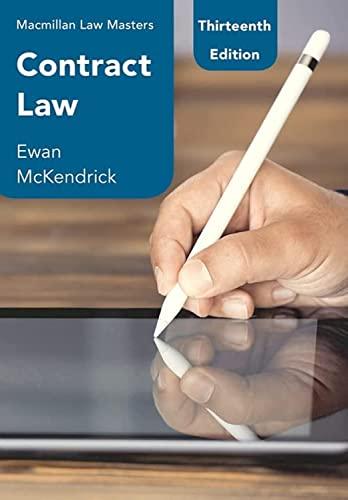Question
Martin and Williams, two business partners, agreed that each would insure his life for the benefit of the other. On his application for insurance, Martin
Martin and Williams, two business partners, agreed that each would insure his life for the benefit of the other. On his application for insurance, Martin stated that he had never had any heart trouble when in fact he had had a mild heart attack some years before. Martin's policy contained a two-year incontestable clause. Three years later, after the partnership had been dissolved but while the policy was still in force, Martin's car was struck by a car being negligently driven by Peters. Although Martin's injuries were superficial, he suffered a fatal heart attack immediately after the accidentan attack, it was established, that was caused by the excitement. The insurer has refused to pay the policy proceeds to Williams. Does the insurer have a valid defense based on Martin's misrepresentation? Explain.
Was it necessary for Williams to have an insurable interest in Martin's life to recover under the policy? Why?
If Williams had taken out the policy rather than Martin, could the insurer defend the claim on the ground that at the time of Martin's death, Williams had no insurable interest? Why?
If Williams had no insurable interest, would the incontestable clause prevent the company from asserting this defense? Why?
If the insurer pays Williams's claim, may it recover from Peters? Why?
Step by Step Solution
There are 3 Steps involved in it
Step: 1

Get Instant Access to Expert-Tailored Solutions
See step-by-step solutions with expert insights and AI powered tools for academic success
Step: 2

Step: 3

Ace Your Homework with AI
Get the answers you need in no time with our AI-driven, step-by-step assistance
Get Started


